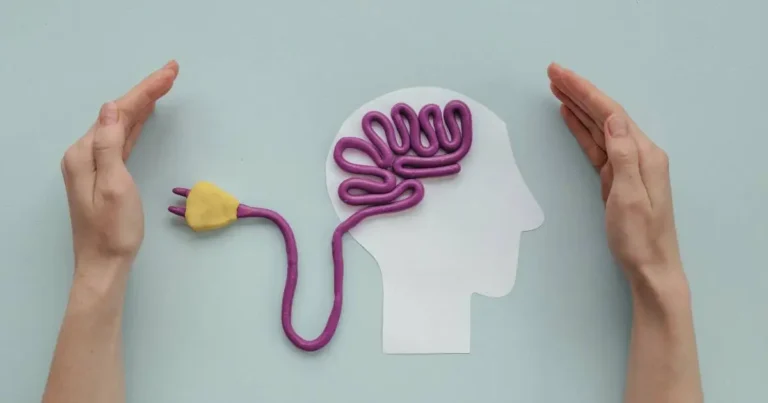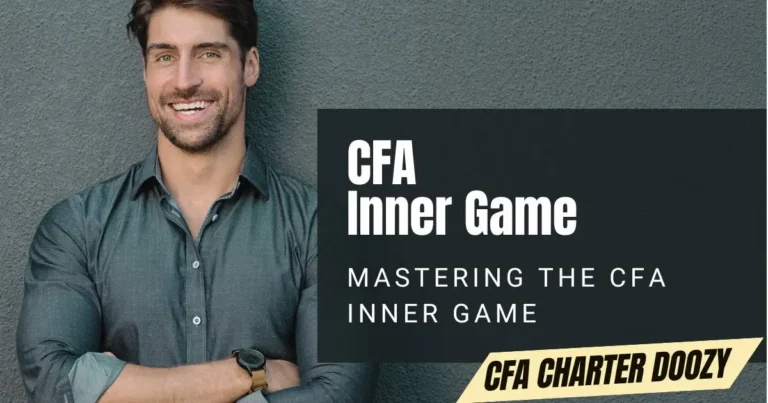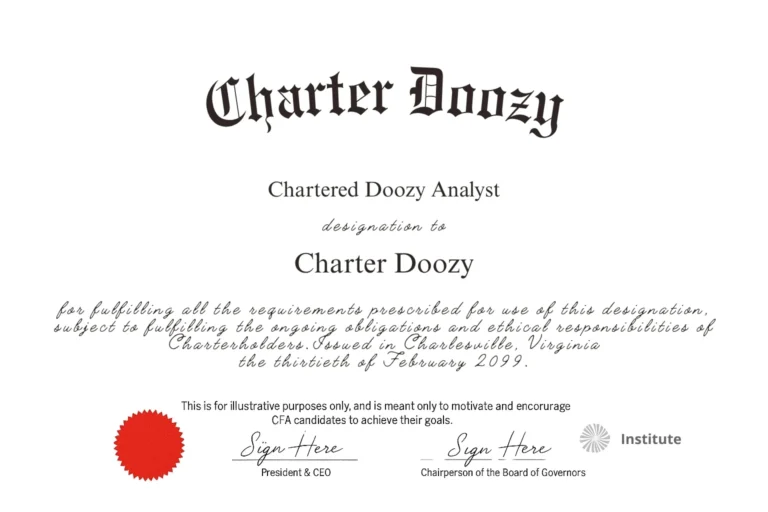A few years ago I interviewed some recently qualified CFA Charterholders to better understand their experiences with the CFA Program.
One of the things I asked them was to describe their experience preparing for the CFA exams.
Here are some of the transcribed responses:
Doubt would creep in… was I studying the right way… I often questioned about my decision to do the CFA in the first place.
[The CFA Program] is an emotional rollercoaster, filled with highs and lows that test your mental and emotional resilience.
The sheer volume of content [began to weigh on me]. I found myself feeling overwhelmed, especially when I was working through difficult topics or when my study schedule slipped because of work or personal commitments
This knowledge [that many candidates fail their first attempt] created a constant stress which I couldn’t shake… At times it felt almost almost suffocating.
The CFA journey is f-cking isolating… I was in a bubble of study materials and deadlines… but I didn’t care. The loneliness was one of the hardest parts for me.
This [hope] gave me the energy to push through the final stretch of preparation.
After each exam I felt a strange mix of relief and exhaustion… I didn’t care anymore if I passed or failed.
Certain topics are painfully boring… especially like ethics or financial reporting… you need to do a lot of memorization and repeated practice… sometimes led to extreme boredom which slowed me down a lot.
Do you notice anything common in these responses?
These all describe the mental or emotional experience of the CFA journey.
I never specifically asked these individuals to give me their feelings.
In fact, I was expecting them to discuss their study routines, how they approached the curriculum, which topics they found easier or more difficult, and what tips or tricks they found particularly helpful.
But instead, almost everyone described things such as their emotional state and inner psychology.
Clearly the emotional journey was so intense that it is the major impression which remains once the memory fades.

The CFA and Tennis
There is a well-known concept in sports psychology known as the “inner game” and the “outer game”.
This was popularized by Timothy Gallwey in his book The Inner Game of Tennis and helps conceptualize an athlete’s overall performance.
The Outer Game
The “Outer Game” refers to the external aspects of performance, which are visible and measurable. In tennis, this includes:
- Physical Skills: Your ability to serve, volley, rally, and perform all the technical strokes. This is where training, practice, and physical conditioning come into play.
- Strategy and Tactics: How you approach each match, including shot selection, positioning, reading your opponent, and making tactical decisions during play.
- Competition and Results: The actual outcomes of your matches, your rankings, wins and losses, and how you perform under competitive pressure.
- External Factors: Elements like weather, the condition of the court, the behavior of your opponent, and the influence of the crowd.
The Outer Game is what most people focus on, as it directly involves your performance on the court and is often the only aspect visible to others.
Doozy Digest
A newsletter for CFA candidates
Subscribe for:
✔ Insightful tips
✔ Expert advice
✔ Career motivation
✔ Exam inspiration
Stay updated and subscribe today!
In the context of preparing for the CFA exams, the “Outer Game” might refer to the tangible, external aspects of CFA exam preparation, such as:
- Study Materials and Resources: The textbooks, study guides, practice exams, and any other materials you use to prepare. This includes the CFA Institute’s curriculum, third-party study notes, and review courses.
- Study Schedule and Time Management: How you organize your study time, the number of hours you dedicate each day or week, and how you balance studying with other commitments. This also involves breaking down the curriculum into manageable chunks and setting deadlines for completing each topic.
- Practice and Application: The number of practice questions you complete, mock exams you take, and your ability to apply concepts to exam-style questions. This is where repetition, active learning, and mastery of the content come into play.
- Physical Preparation: Ensuring you’re physically prepared for the long study sessions and the exam itself, including getting enough sleep, maintaining a healthy diet, and managing any physical strain from long hours of studying.
The Outer Game involves the concrete steps you take to prepare for the exam.
It’s about the strategies, tools, and practices you put in place to cover the curriculum and perform well on exam day.

The Inner Game
The “Inner Game,” on the other hand, deals with the internal, mental, and emotional aspects of performance.
For competitive tennis this includes:
- Mindset: Your attitude, confidence, and self-belief. How you perceive challenges and setbacks, and whether you maintain a growth mindset or succumb to a fixed mindset.
- Focus and Concentration: Your ability to stay present, maintain focus during points, and avoid distractions. This is crucial in a sport like tennis, where concentration can fluctuate with each point.
- Emotional Control: Managing emotions such as frustration, anger, anxiety, or overexcitement. How you react to mistakes, bad calls, or challenging situations on the court.
- Self-Talk: The internal dialogue you have with yourself. Positive self-talk can boost confidence and resilience, while negative self-talk can lead to self-doubt and poor performance.
- Mental Toughness: The ability to persevere under pressure, stay composed in high-stakes situations, and bounce back from setbacks.
The Inner Game is about mastering these mental and emotional elements to optimize the Outer Game performance.
For CFA exam preparation this could include:
- Mindset and Attitude: Your beliefs about your ability to pass the exam, your motivation for pursuing the CFA designation, and your overall attitude towards the challenge. A positive, growth-oriented mindset can be a powerful driver of success.
- Focus and Concentration: Your ability to stay focused during long study sessions, avoid distractions, and maintain concentration on difficult topics. The Inner Game involves training your mind to sustain focus and efficiently process information.
- Emotional Regulation: Managing stress, anxiety, and any feelings of overwhelm that arise during preparation. This includes dealing with the fear of failure, coping with setbacks, and staying calm under pressure, especially as the exam date approaches.
- Self-Discipline and Resilience: The Inner Game also encompasses the mental toughness required to stick to your study plan, push through periods of boredom or fatigue, and bounce back from poor practice test results. It’s about maintaining discipline, even when motivation wanes.
- Self-Talk and Confidence: The internal dialogue you have with yourself during preparation. Positive self-talk can boost confidence and help you stay motivated, while negative self-talk can lead to self-doubt and a decrease in performance.
The Inner Game is about mastering your mental and emotional state to enhance your ability to prepare effectively and perform well on exam day.
It’s the unseen, psychological side of preparation that can often make the difference between passing and failing.

Interplay Between the Inner and Outer Game
Success in tennis, or any high-stakes game, often requires a balance between the Inner and Outer Game. A player with exceptional physical skills (Outer Game) but poor mental control (Inner Game) may struggle to perform consistently, especially under pressure.
Conversely, a player with a strong Inner Game can often outperform more physically skilled opponents by staying calm, focused, and mentally tough during critical moments.
You know another high-stakes game?
The CFA exams.
Just like a tennis pro, success in the CFA Program requires a balance between the Inner and Outer Game.
A Strong Outer Game Alone Isn’t Enough.
You could have the best study materials, a well-structured schedule, and complete numerous practice exams, but if your Inner Game is weak—if you’re overwhelmed by stress, unable to focus, or constantly doubting yourself—it will be difficult to perform at your best.
A Strong Inner Game Enhances the Outer Game.
Conversely, if your Inner Game is strong—if you’re confident, focused, resilient, and able to manage your emotions—you’ll be able to make the most of your Outer Game efforts. You’ll study more effectively, retain information better, and perform more confidently on exam day.
In essence, the Inner Game is about developing the mental and emotional resilience needed to support and maximize the effectiveness of your Outer Game.
Success in the CFA exams often hinges on a candidate’s ability to master both the Inner and Outer Game, ensuring that they are fully prepared not just intellectually, but mentally and emotionally as well.

The CFA Inner Game
We often talk about the Outer Game of CFA exam preparation, which isn’t surprising—it’s the tangible, external aspect of the process. However, the Inner Game is equally important.
What is the ideal mindset, attitude, and emotional stance of successful candidates? How should you position your Inner Game to maximize your chances of CFA success?
I believe everyone is different, and there is no one-size-fits-all approach.
However, after working with successful candidates for over a decade, I’ve noticed some common characteristics:
Mental Toughness: Successful candidates have the willpower and discipline to endure and thrive in challenging situations. They cultivate inner strength, embracing difficulties as part of the journey to success.
Self-Sacrifice: A willingness—even a desire—to prioritize passing the CFA exam over personal interests is crucial. It’s not helpful to sit in the library on a Saturday afternoon wishing you were at a friend’s barbecue. You need to be willing to make sacrifices in other areas of life to carve out space for CFA study.
Confidence: Develop a strong belief in your abilities and training, without letting it make you arrogant or blind to your shortcomings. Believe in your capacity to master the CFA Program if you apply yourself appropriately and work hard. Don’t forget to celebrate small victories along the way.
Courage: Face difficulty and danger head-on. Tackle the most challenging subjects upfront instead of avoiding them. Embrace challenges as opportunities to grow and learn.
Determination: Maintain unwavering commitment to achieving your goals. Set clear objectives and remain steadfast in achieving them, regardless of obstacles. Visualize passing the CFA exam and the benefits it will bring.
Accountability: Take responsibility for your actions and outcomes. Hold yourself accountable for your success or failure. Use tools like study logs or accountability partners to track and assess your performance regularly.
Resilience: Setbacks are inevitable. You need to recover quickly and maintain focus under pressure. Bounce back from setbacks, like poor practice exam results, and be flexible with study methods and strategies. If a particular approach isn’t working, be willing to try new techniques and resources. Maintain a positive attitude and learn from mistakes rather than getting discouraged.
Humility: Recognize the importance of continual learning and improvement. Understand that there is always more to learn. Seek feedback and be open to adjusting your study techniques based on what works best. Pair determination with a quiet, fierce resolve.
Calmness: Maintain composure and clear thinking in high-stress situations. Practice stress-management techniques such as deep breathing, meditation, or exercise to stay composed during study sessions and the exam itself. A level head is a valuable asset on the CFA journey.
Focusing on these aspects of the Inner Game can significantly enhance your chances of success on the CFA exams.

Final Thoughts
Success in the CFA exams requires mastery of both the Outer Game and the Inner Game.
The Outer Game is well-covered online and by every CFA prep provider, offering plenty of resources and strategies to help you prepare.
However, neglecting the Inner Game can be a critical mistake.
The Inner Game is where your mindset, attitude, and emotional resilience come into play. It’s the foundation that supports all your Outer Game efforts. When we notice mindset weaknesses in our coaching clients, we act swiftly to address them because a poor attitude can undermine even the best preparation.
Think of it as a virus that, if left unchecked, can sabotage your chances of success.
By focusing on cultivating a strong Inner Game (alongside your Outer Game) you can position yourself for success in the CFA exams, ensuring you’re fully prepared not just intellectually, but mentally and emotionally as well.

